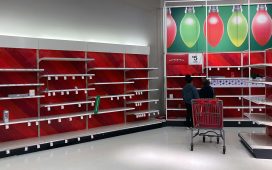Supermarkets are spending hundreds of millions of pounds on promotional deals for shoppers, as the grocery price war ramps up.
Together, nearly 30% of total spending by Britain’s biggest supermarkets was on special offers and discounts in the four weeks ended 20 April, according to the market research company Kantar.
Fraser McKevitt, the head of retail and consumer insight at Kantar, said grocers had been offering big price cuts to stay competitive. “They’ve invested in price cuts which were the main driver of promotional growth,” he said. “Often linked to loyalty cards, spending on these deals grew by £347m. At Tesco and Sainsbury’s, nearly 20% of items sold are on a price match, and they end up in almost two-thirds of baskets.”
While supermarket profit margins are typically thin, the cost of living crisis combined with fierce competition in the sector has meant some of the biggest businesses in the industry have been caught in a race to the bottom on prices.
Last month Asda said it expected significantly lower profits this year and would start to invest in lower prices for its shoppers. Allan Leighton, the chair of the privately owned group that runs more than 580 supermarkets, said it was “an investment warning, not a profit warning”. Leighton’s comments were enough to wipe off about £4bn of the collective market value of its listed rivals Tesco, Sainsbury’s and Marks & Spencer that week.
Asda has since cut prices on 1,500 products, including on products such as Cathedral City cheddar cheese and Head & Shoulders shampoo. The grocer said in March that its latest round of cuts meant that it had reduced prices on nearly 10,000 products since the end of January. Despite the push, Asda was the only supermarket where sales fell over the past three months compared with the same period last year.
While supermarkets are increasing promotional deals, grocery prices overall are still rising, Kantar found. Grocery price inflation rose to 3.8% in the four weeks ended 20 April, which was the highest level in more than a year and well above the recent low of 1.4% in October 2024.
However the Easter period meant supermarkets were still busy, with spending up 11% compared with the four weeks in the run-up to Easter last year, despite a 17.4% rise in chocolate confectionary prices.
McKevitt said: “The volume of chocolate eggs sold through supermarket tills still grew by 0.4% on last year, while at the dinner table lamb was the most popular fresh meat joint, followed by beef and pork. Some households chose to indulge in less seasonal fare as the sun came out and they dusted off the barbecue, with burger sales shooting up by 31% over the last month.”
after newsletter promotion
Tesco still has the biggest share of the market, at 27.8%, Kantar found. It was followed by Sainsbury’s at 15.3% and Asda at 12.3%. Ocado was the fastest growing, continuing a trend over the past year, with sales up 11.8% compared with 12 months ago, although its market share remains at a modest 1.9%.
Aldi is the fourth biggest, with a market share of 11%, having overtaken Morrisons in 2022.









